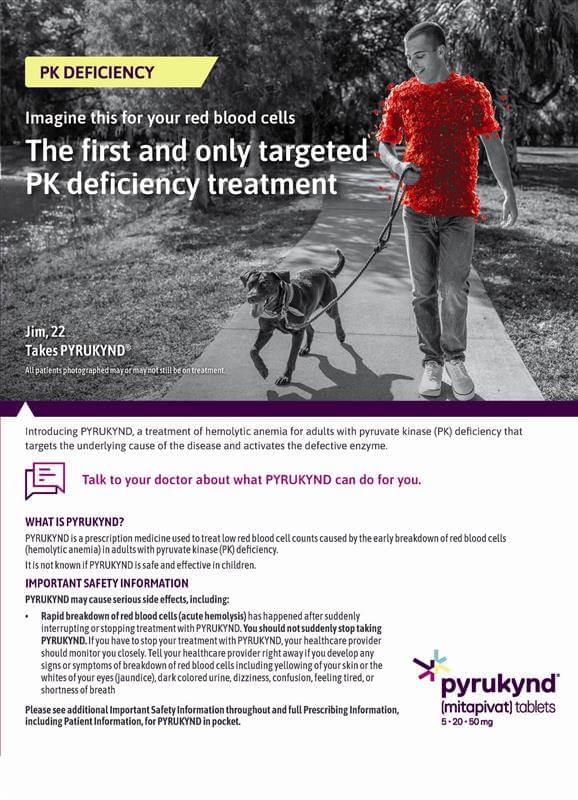Resources
Resources about PK deficiency and PYRUKYND® (mitapivat) for your patients
The resources below can provide further support for physicians and patients regarding myAgios® Patient Support Services, pyruvate kinase (PK) deficiency, treatments, and financial support.
Resources for Physicians
PYRUKYND Enrollment Form

Download the PYRUKYND Enrollment Form needed for prescribing PYRUKYND and enrolling patients in the myAgios Patient Support Services program.
Annotated PYRUKYND Enrollment Form

Download the annotated PYRUKYND Enrollment Form, which can help guide physicians and office staff when completing the form.
PYRUKYND Dosing Guide

Dosing information for you and your patients, including dose titration, missed doses, and dose tapering.
PYRUKYND Quick Reference Guide

Information on PYRUKYND clinical trial data, safety, and dosing for you and your patients.
Resources for Your Patients
PYRUKYND Patient Website

Watch videos of PYRUKYND patients discussing their experiences with treatment and explore additional information and resources for PK deficiency.
About PYRUKYND Brochure

An overview of PYRUKYND treatment for PK deficiency as well as tools to help patients work closely with you to proactively manage their condition.
myAgios Patient Brochure

Provides patients with an overview of the customized support program for people living with PK deficiency and being treated with PYRUKYND.
This program is not intended as medical advice and patients should consult their healthcare team with questions related to their treatment.
Indication
PYRUKYND is a pyruvate kinase activator indicated for the treatment of hemolytic anemia in adults with pyruvate kinase (PK) deficiency.
Important Safety Information
Acute Hemolysis: Acute hemolysis with subsequent anemia has been observed following abrupt interruption or discontinuation of PYRUKYND in a dose-ranging study. Avoid abruptly discontinuing PYRUKYND. Gradually taper the dose of PYRUKYND to discontinue treatment if possible. When discontinuing treatment, monitor patients for signs of acute hemolysis and anemia including jaundice, scleral icterus, dark urine, dizziness, confusion, fatigue, or shortness of breath.
Hepatocellular Injury in Another Condition: In patients with another condition treated with PYRUKYND at a higher dose than that recommended for patients with PK deficiency, liver injury has been observed. These events were characterized by a time to onset within the first 6 months of treatment with peak elevations of alanine aminotransferase of >5x upper limit of normal (ULN) with or without jaundice. All patients discontinued treatment with PYRUKYND, and these events improved upon treatment discontinuation.
Obtain liver tests prior to the initiation of PYRUKYND and monthly thereafter for the first 6 months and as clinically indicated. Interrupt PYRUKYND if clinically significant increases in liver tests are observed or alanine aminotransferase is >5x ULN. Discontinue PYRUKYND if hepatic injury due to PYRUKYND is suspected.
Adverse Reactions: The most common adverse reactions including laboratory abnormalities (≥10%) in patients with PK deficiency were estrone decreased (males), increased urate, back pain, estradiol decreased (males), and arthralgia.
Drug Interactions:
- Strong CYP3A Inhibitors and Inducers: Avoid concomitant use.
- Moderate CYP3A Inhibitors: Do not titrate PYRUKYND beyond 20 mg twice daily.
- Moderate CYP3A Inducers: Consider alternatives that are not moderate inducers. If there are no alternatives, adjust PYRUKYND dosage.
- Sensitive CYP3A, CYP2B6, CYP2C Substrates Including Hormonal Contraceptives: Avoid concomitant use with substrates that have narrow therapeutic index.
- UGT1A1 Substrates: Avoid concomitant use with substrates that have narrow therapeutic index.
- P-gp Substrates: Avoid concomitant use with substrates that have narrow therapeutic index.
Hepatic Impairment: Avoid use of PYRUKYND in patients with moderate and severe hepatic impairment.
Please see full Prescribing Information for PYRUKYND.